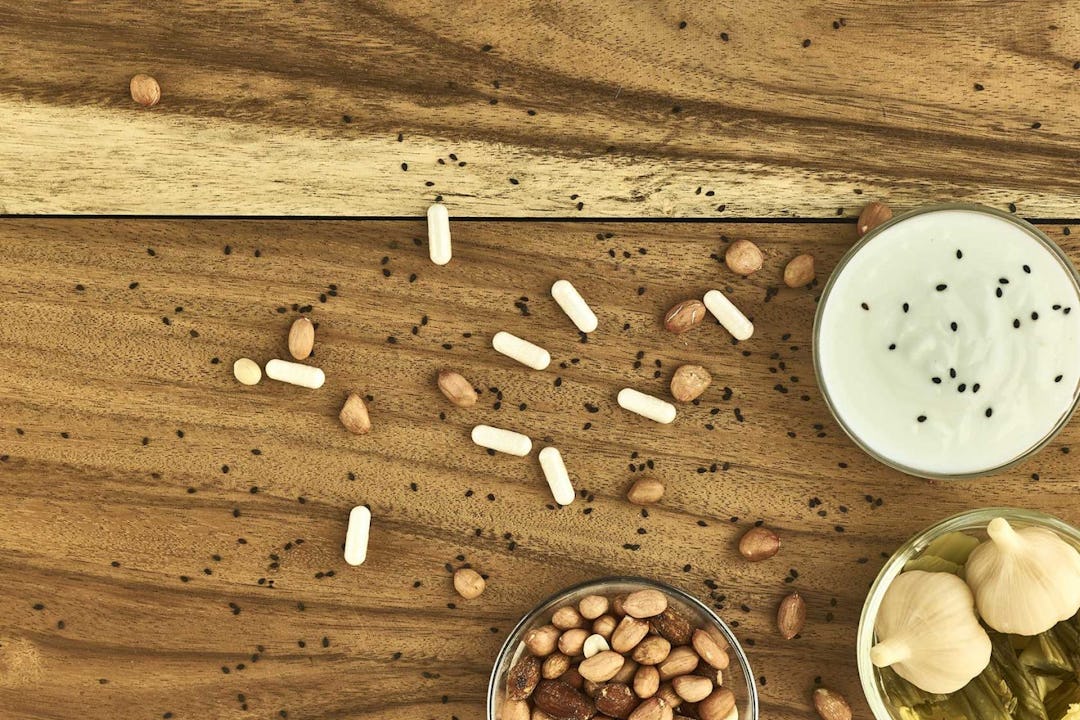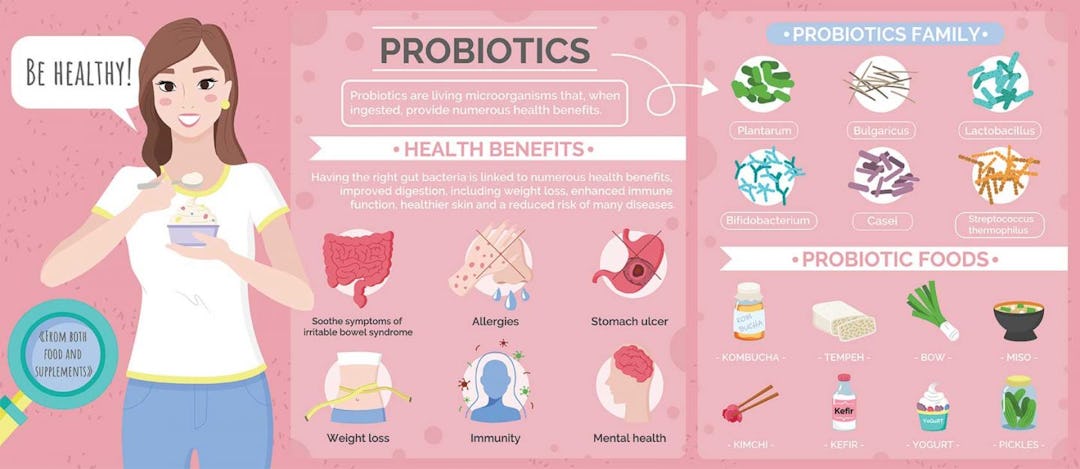With so many probiotics to choose from today, it can be overwhelming to decide which one is best for you. To determine which probiotic to try, it’s important to first understand how probiotics may support certain concerns and which ones may be most beneficial for women’s health.
What Are Probiotics?

Probiotics are often called “good bacteria”. They are living microorganisms that may have positive impacts on various aspects of your health, depending on the type of probiotic strain and the dose taken.
While your body is made up of millions of bacteria, your digestive system is home to your gut microbiome, a community of bacteria that is unique to you from before birth. Research indicates that your microbiome is altered throughout your life by your lifestyle and personal habits. For instance, the places you spend time, your environmental exposures, your diet, how much you exercise, the medications you take, other health conditions, and even mental stress can influence what your microbiome looks like. As such, your gut bacteria typically looks very different from that of people around you, especially if you lead very different lifestyles.
The primary reason most people take probiotics is to support their digestive health. For example, many people turn to probiotics in hopes of helping gas and abdominal bloating, diarrhea, or other mild symptoms of an upset stomach.
Furthermore, the gut-mind connection is a well-researched relationship. It’s often said that health begins in your gut, which means that keeping your digestive system healthy may support your wellbeing in other areas, too. For instance, probiotics have also been studied for their potential to support healthy weight loss.
Most probiotics contain at least two species of bacteria, which are primarily Lactobacillus or Bifidobacterium. It’s likely that different strains can act differently in the body and have different results on health.
You can find probiotics in several different forms. For example, many probiotic supplements come in a capsule or powder.
Others can be found in fermented foods and functional beverages, such as:
- Probiotic juices that have good bacteria strains added to them
- Kefir, made by adding kefir grain cultures of lactic acid bacteria and yeast to milk
- Kombucha, a carbonated, fermented drink made with green or black tea
- Yogurt, made from dairy or nondairy milk that has been fermented by good bacteria
- Tempeh, a fermented soybean patty
- Natto, a sticky fermented soybean product that contains Bacillus subtilis bacteria
- Pickles, made by cucumbers fermented with their own lactic acid bacteria in a salt and water solution (note that if pickles are made with vinegar, they are not fermented and therefore do not contain probiotics)
- Miso, a fermented soybean paste made with salt and koji fungus
- Sauerkraut, or shredded cabbage (often with other vegetables) fermented by lactic acid bacteria
- Kimchi, a fermented spicy cabbage product
- Some cheeses, like cottage cheese, Gouda, cheddar, and mozzarella, which typically maintain their good bacteria through the aging process
How Can Probiotics Help My Digestive System?

With so many factors potentially altering your digestive bacteria on a daily basis, it can be helpful to keep the good bacteria in your microbiome in top fighting shape. Probiotics are an easy way to add more good bacteria colonies to your gut microbiome.
Research suggests that probiotics may be helpful for diarrhea often associated with the use of antibiotics prescribed for bacterial infections. Because antibiotics can kill off both bad and good bacteria in your gut, probiotics may act as a buffer, populating your gut with more good bacteria at the same time. The probiotic yeast Saccharomyces boulardii may be particularly helpful for this purpose.
For women specifically, utilizing probiotics (especially L. acidophilus) may also benefit conditions like bacterial vaginosis, complicated vulvovaginal candidiasis, and urinary tract infections caused by imbalances. Much of these imbalances stem from a lack of lactobacilli or an overgrowth of other types of bacteria, and can be worsened by the use of antibiotics typically prescribed for them. Probiotics may target certain imbalances and modify the inner vaginal microbiome for women.
Regularly adding probiotics to your diet can help maintain a healthy ratio of good bacteria in your gut. This can, in turn, support your immune system, as well as your digestive and mental health. In fact, Bifidobacterium and Lactobacillus may positively impact obsessive-compulsive disorder, depression, and anxiety – again, because of the gut-brain connection.
What is the Most Effective Probiotic?

The most effective probiotic for you can depend on a number of factors, such as the strain of bacteria in the product, how many bacteria it contains, how the probiotic is stored, whether the product contains prebiotics, and what condition you’re looking to target.
Sources that contain both probiotics and prebiotics can be a good choice, as the latter acts as fuel for the good bacteria.
A 2018 review published in the Journal of Clinical Pharmacology concluded that, based on current evidence, probiotics appear to be most effective for the following conditions:
- Necrotizing enterocolitis, a disease in which bacteria attack (and can ultimately destroy) the intestine of premature infants
- Acute infectious diarrhea, which can be caused by bacteria, viruses, or sometimes parasites
- Acute respiratory tract infections, a contagious infection of your upper respiratory tract, such as the common cold or sinusitis
- Antibiotic-associated diarrhea, caused by the use of antibiotics that kill off gut bacteria
- Infant colic, or periods of fussiness in otherwise healthy and happy babies, likely related at least in part to digestive discomfort
It’s also important to keep in mind that probiotics may work differently for males and females, but more research is needed to determine specifically how much. Some research indicates that probiotics may be more effective in supporting long-term weight loss for females.
Because there is so much heterogeneity among evidence for probiotic effectiveness, depending on their strain, composition, dosing, and intention, more research is needed specific to probiotics and their applications in women’s health.
Although more studies are needed, below are some of the strains and digestive complaints they may be most helpful for based on current research:
- Constipation: B. longum, S. cerevisiae and a combination of L. acidophilus, L. reuteri, L. plantarum, L. rhamnosus and B. animalis
- Diarrhea: L. rhamnosus GG, L. acidophilus, and L. bulgaricus
How Often Should I Take Probiotics?

If you’re new to taking probiotics, be aware that they might cause side effects like bloating, gas, or loose stools. These typically go away within a few days. It might help to start with a smaller dose than recommended and slowly increase as tolerated.
Recommendations for how often to take probiotics vary. Some research suggests that taking a dose of between 5-10 billion colony forming units (CFUs) once per day is more effective than lower doses.
How long you should take probiotics likely also depends on the condition you’re trying to help. For intermittent issues like constipation, taking probiotics until the issue is resolved is usually recommended. For more chronic conditions like irritable bowel syndrome, your health provider may suggest using probiotics more frequently or for longer durations.
It may not make sense to take probiotic supplements every single day like you might a multivitamin. However, incorporating probiotic food sources in your routine on a more regular basis, and taking probiotic supplements as needed, may support an overall healthy microbiome.
If you have an underlying immune condition, illness, or are unsure which strain to try, it’s always best to speak with your healthcare provider before adding anything new to your routine, including probiotics.
How Do Prebiotics Differ From Probiotics?

Prebiotics can be considered a food or fertilizer for probiotics and gut bacteria. They’re a dietary fiber that your body cannot digest. Prebiotics may specifically benefit your health by supporting normal metabolism and digestion.
While many probiotic supplements also contain prebiotics, prebiotics can also be found naturally in a variety of foods. Some foods that offer prebiotics include garlic, leeks, onions, asparagus, barley, bananas, Jerusalem artichokes, oats, cocoa, apples, flax seed, jicama, and seaweed. Chicory root is often added to probiotic products as a source of prebiotics.
Best Probiotics for Women’s Health

There’s no evidence that adding probiotics to your regular routine is harmful to your health, and there are many potential benefits they may offer. When it comes to women’s health, probiotics may not only help certain stomach woes, but also support the health and balance of your vaginal microbiome.

)






